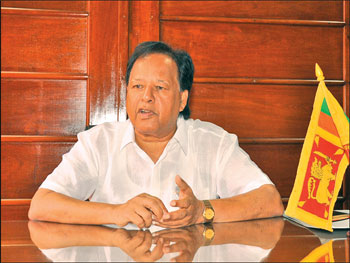'Relationship between IMF and Lanka stands at its best'
Ramani KANGARAARACHCHI
 One of the main aspects of the global economy is the euro zone
crisis. Several countries in the EU namely Greece, Spain, Ireland,
Portugal and Italy were threatened with financial collapse. The main
reason for this is that these countries carry a huge impact on social
and welfare programmes, said international Monetary Cooperation Senior
Minister Dr. Sarath Amunugama. One of the main aspects of the global economy is the euro zone
crisis. Several countries in the EU namely Greece, Spain, Ireland,
Portugal and Italy were threatened with financial collapse. The main
reason for this is that these countries carry a huge impact on social
and welfare programmes, said international Monetary Cooperation Senior
Minister Dr. Sarath Amunugama.
He was interviewed by Daily News Business for the new feature
starting today, Mr. Minister
How Sri Lanka will cope in the backdrop of Euro zone crisis?
They have to borrow from banks and neighbour countries to offset the
budget deficit. In other words their income both domestic and through
trade is not sufficient to their budgetary commitments. Since they have
a long tradition of politically motivated handouts they are now faced to
cut back subsidies because banks do not lend money to them. This leads
to dissatisfaction in the work places and streets where the workers have
been used to have a grand time with borrowed money.
|

Minister Dr. Sarath Amunugama. Picture by Sumanachandra
Ariyawansa |
However these loans come with many conditions. The main thing is that
they should cut down subsidies and welfare programs and learn to live
with their means. This leads to political crisis where leaders have to
handover power to tough financial ministers who are not afraid to cut
down subsidies.
How does this affect Sri Lanka?
When there is no growth in the euro zone which is one of the biggest
market in the world there will be less demand for our exports. Their
exports are two kinds. Products such as rubber, coconut fibre will face
a slight loss of demand when EU industries cut back. Secondly when
buyers of tea which are consumption items will also face a cutback. They
have less money in their pockets. But compared to other developed
countries like China, Malaysia and India our export sector is limited.
Actually advantage to our economy has been largely through agriculture
and service sector. So we will probably be less affected than the big
export countries.
Other aspect with the bail out package of the EU and IMF is that
these sick economies will begin to be healthy.
Earlier politicians were not willing to become rational since it
would result in loss of votes. But now they are forced to forget votes
and create a much better realistic economy. So they are likely to become
more healthier economies. In the long run these healthy economies will
turn better and ailing economies will be heading for trouble. In my view
too crisis has helped politically motivated countries to cut down on
subsidies and getting to the world of trade manufacturing and
investment. So called socialist politicians in countries have been
kicked out of office. Tough new finance ministers have taken over and we
hope they will be able to stop the rot and make these economies viable.
Will current focus on infrastructure help the rural economy?
One of the chief policies of the present government is to develop
infrastructure of the country. Without infrastructure an economy cannot
grow. China, India Brazil and Russia will become strong economies
because they invested on energy, transport, harbours and roads.
Particularly a nation like Sri Lanka had to invest in our ports and
shipping which is our life line. Very few people know that two third of
the world shipping lines go pass Hambantota. The sea lanes from middle
east to far east go along Sri Lankan coast. On the other hand Sri Lanka
is a hub for travel and tourism. We have a advantage being able to move
from middle east, India and far east. No other country has such a hub
position. So it is very logical that we develop our ports, airports and
harbours.
Another point based on my experience with international organizations
in the coming decade will be focusing on what is called blue economy.
This is a concerted attempt to harness the resources of the sea for
mankind. The resources specially land based resources are fast
developing largely to population increase and environmental degradation.
Hence mankind should focus on the sea for survival where most of the
resources are available in the two key areas of energy and fuel.
Due to our strategic position. Sri Lanka is well positioned for rapid
growth under the forthcoming blue economy. Hence we should have a vision
of harnessing the sea because in the future sea will be equally
important as land.
With regard to IMF does the WB and IMF support Sri Lanka in
development efforts as it used to?
The relationship between IMF and Sri Lanka stands at its best. We
have been allocated USD 2.6 billion at a stand-by arrangement. Sri Lanka
is one country which has stabilized its economy. In terms of global
criteria we have restructured the economy. The budgetary deficit has
been drastically reduced. Interest rates have come down. The rupee is
stabilized as a currency. Unemployment and poverty levels have come
down. So we have managed our country well during the last few years.
This has been recognized by both WB and IMF.
Now we have considerable foreign resources at our command. Equally we
can expect considerable dollar income to the country through
remittances, tourism and exports. Hence we are in a stable position Also
we have progressively reduced our foreign debts. Global rating agencies
have given good ratings which helps us to lower interest rates or
sovereign and other bond despite lower interest rate. There is a strong
appetite for Sri Lanka. Of course we have a research economy. It has to
be managed day by day, and week by week. We have to review foreign
factors in taking economic decisions, oil and food prices have to be
carefully watched. So far we have got our macro economic conditions
right and established the great path of eight percent GDP growth. These
are great achievements by any standards and have been recognized by IMF
with rating agency and the private sector.
What affect would the devaluation of rupee have on the economy?
The Sri Lankan economy has special characteristics. On one side we
have to expand our export base. Today the slogan of growth in the world
is "export, export, export". The famous saying is export or perish. On
the other hand we have to keep a watchful eye on imports. Today our
imports cost much more than exports leading to a balance of payment
deficit which have to be tackled. Last year we bought half a million
vehicles of different conditions. Old and new "under valued". There was
a flood of foreign consumer items which threatened to under cut local
industry. For example ceramic industry which has lots of potential has
to be safeguarded. Equally companies like Singer, Abans and Richard
Peiris which are manufacturing some important items cannot be swept away
by rushing in of products due to a cheaper rupee. On the other hand our
economy shows that we have to pay huge bills for old machinery and
infrastructure. Devalue of rupee means we have to find money, more
rupees to pay for all these. Equally our foreign debt requirement have
to be calculated at a higher rupee rate. All these factors have to be
balanced when we think of the exchange rate. But the overriding economic
wisdom is that we cannot shut out the market fluctuations. So the
problem is to seek an exchange rate which can balance these two
imperatives. My personal opinion is that we cannot shut out the market
for a long term by intervention. Reality will prevail.
Can we achieve nine percent per capita income and what is the
target that government has set to reach this target?
This year GDP growth is 8.2 percent. Years 2010 and 2011 showed us
that we can reach this target. Of course all GDP targets are indicative
targets. Some factors we cannot control such as climate and food. If all
these things are in order we should remain at eight percent growth. The
main reason is North and East is integrated with the national economy.
We must remember that the north and east people are outstanding farmers
and workers. The rural farmers and workers are pushing our economy
forward. Urban workers are fast becoming redundant. With the coming of
new technology these urban workers have to work harder or perish. Sri
Lanka has to remove these parasites who are dragging large part of the
national income. They do not add anything to the national economy. But
they are asking for salary increase where it should be the reverse. But
it cannot be done due to political reasons. Their salaries should be
reduced and more funds should be allocated to farmers and workers in
rural areas.
There will be a pull from rural areas to urban areas. What the worker
do not realize is that by such behaviour they are forcing investors to
seek new science and technology to replace them. This leads us to go for
a complete change of our education system. People who have vested
interest in the old system are agitating but they do not realize that
unless our education system is modernized and if we do not focus on
these new sectors there will be economic problems. No work more pay
syndrome has to be replaced with people who can adopt to new technology. |



